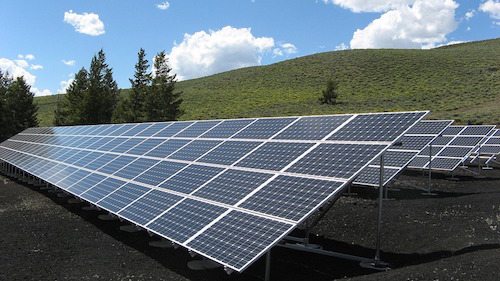
UPDATE: Councilman Kach withdrew the bill and there was no vote on it. The Sun has details.
Councilman Wade Kach, who represents norther Baltimore County, has a bill up for a vote tonight (Tuesday) that would put limits on solar farms.
“Currently, Baltimore County does not have any regulations in place to regulate ‘solar farms, or any form of enterprise which places solar energy on a parcel of land for the purpose of generating solar power for commercial use. However, a recent administrative decision by the County has determined that commercial solar farms may be located in the rural areas of the County as a ‘public utility,'” Kach said on his website. “While it is undisputed that solar energy is a clean and renewable resource that can lead to reduced air and water pollution from the use of fossil fuels, I am deeply concerned about how the proliferation of commercial solar farms will impact agricultural land and water quality in the greater Baltimore area.”
This new law “would impose restrictions and regulations on commercial solar farms in regard to zoning placement, minimum and maximum acreages of the solar array, and required set-backs from adjacent property owners. In addition, other regulations will apply to: screening, storm water management, maintenance and the posting of a bond for the removal of obsolete panels,” Kach said.
Councilman David Marks, who represents the Towson area, said he is “undecided” on the bill.
“I strongly support more solar energy production in Baltimore County, and supported legislation that provides greater flexibility for homeowners who wish to install solar panels on their rooftops. At the same time, I do believe there should be reasonable restrictions on large solar arrays in environmentally-sensitive and historic areas,” Marks said in an email.
“My main concern has been how the County Executive can contract with private companies to put solar arrays on public property, like parks. Last year, the County Executive vetoed a bill that would have required better notification and input. It is reasonable to require broader input before the county allows solar arrays at our parks and other public property,” Marks said.
Kach also said on his blog that although “it is undisputed that solar energy is a clean and renewable resource that can lead to reduced air and water pollution from the use of fossil fuels, I am deeply concerned about how the proliferation of commercial solar farms will impact agricultural land and water quality in the greater Baltimore area. … It is not a mystery as to why there is such interest to locate commercial solar arrays on farmland, since it is much cheaper to construct commercial solar fields on agricultural land than on commercial property. Solar companies are paying landowners $1,000 to $1,250 a year for each acre leased. Additionally, some companies are offering to pay the increased property tax bill that will accompany the operation of commercial solar fields on agricultural land.”
